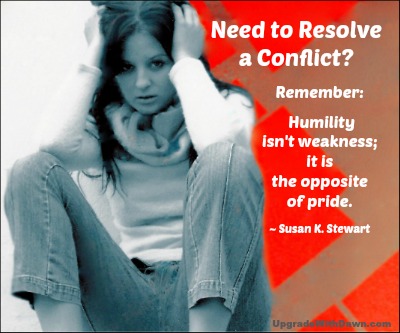7 Steps to Resolve Conflict (Hint: It Takes Humility!)
Susan K. Stewart is a practical gal with a lot of wisdom. In this Relationships UPGRADE, she shares important, biblical steps to resolving relationship conflicts.
 "'Not again. How many times can he preach on this subject? Who is it stirring up trouble now?' Those were my thoughts," Susan said, "when I read the sermon title: 'Resolution: The Matthew Solution.'"
"'Not again. How many times can he preach on this subject? Who is it stirring up trouble now?' Those were my thoughts," Susan said, "when I read the sermon title: 'Resolution: The Matthew Solution.'"
Like Susan, I (Dawn) have been uncomfortable in church, wincing with the pinch of a convicting message and wishing the pastor would move on to a less painful topic. Or at least, preach it to someone else! It took me a long time to understand it was really the Spirit of God tugging at my own heart.
Susan continues . . .
A recent undercurrent of discontent infected our congregation. That is often a problem in groups of people We are, after all, sinful humans who happen to be saved by grace. Conflict among Christians should not be a surprise.
“How will he admonish us this week?”
I had developed a terrible attitude about the whole situation. I sat trying to be attentive for that grain of truth God had for me.
Somehow I missed it.
During the following week, God led me to the book of James. I focused on James 4:7-10.
My heart opened to what should have been a no brainer, clear steps to resolving conflict.
1. Submit to God
No matter the circumstances, submit to God. Ask for his wisdom to see the truth, not the colored viewpoint of humans.
Be willing to follow him, wherever it may lead.
2. Resist the devil
As we submit to God, we resist the devil. But the attacks will continue during the peacemaking process.
Satan wants to convince us that we aren’t at fault. He says following God’s way is troublesome, a lot of work, and a hindrance to the outcome we want. As humans, what we want is peace at all cost and to look like the peacemaker.
3. Draw near to God
The more we resist the devil, the closer we move to God. As we move closer thim, the better able we can resist the devil.
The closer we are to God, the more we will be able to remove our own desires and submit to God’s.
4. Cleanse your hands
Here’s where the rubber starts to screech along the road.
What? Me, the sinner? We’ve become ingrained with the truth in Matthew 18: go to the one who has sinned against you. Instead when there’s a clash, we should be looking at our own sin.
“First take the log out of your own eye” (Matthew 7:5 NASB). We need to face our own sin before we confront anyone else’s.
5. Purify your heart
Is the goal of conflict resolution to make everyone happy? Or is it reconciliation with God?
To approach a solution to the friction, our own hearts need to be clean. This is done by seeking to please God, not other people.
Not everyone will be happy, but God will be delighted.
6. Be miserable and mourn and weep
Sin is the root of the strife and we should be saddened and repentant.
As we submit to God’s authority and purify our hearts, we come to realize how destructive our own sin is in the conflict.
7. Humble yourself
Humility isn’t weakness; it is the opposite of pride.
How often is pride the sin at the heart of discord? Humility is the admission we can do nothing on our own.
When pride takes hold, we think we have the solution to any problem. But only God is the true peacemaker.
Don’t worry; you’ll have an opportunity to put these steps into practice.
The next time conflict resolution is the topic of a sermon, article or conversation, remember James’ steps to peacemaking.
Resolve the strife in yourself, and then you will be prepared to help others.
Is there a conflict in your life? How will you follow James’s steps to resolve it?
 Susan K. Stewart—when she’s not tending chickens and peacocks—teaches, writes and edits non-fiction. Her passion is to inspire readers with practical,
Susan K. Stewart—when she’s not tending chickens and peacocks—teaches, writes and edits non-fiction. Her passion is to inspire readers with practical,  real-world solutions. Susan's books include Science in the Kitchen, Preschool: At What Cost? and the award-winning Formatting e-Books for Writers. Learn more about Susan at www.practicalinspirations.com
real-world solutions. Susan's books include Science in the Kitchen, Preschool: At What Cost? and the award-winning Formatting e-Books for Writers. Learn more about Susan at www.practicalinspirations.com
 Post a Comment → Posted on
Post a Comment → Posted on  Thursday, November 10, 2016 at 12:48PM
Thursday, November 10, 2016 at 12:48PM  Cleanse Your Hands,
Cleanse Your Hands,  Conflict Resolution,
Conflict Resolution,  Draw near to God,
Draw near to God,  Humble Yourself,
Humble Yourself,  Humility,
Humility,  Mourn,
Mourn,  Pride,
Pride,  Purify Your Heart,
Purify Your Heart,  Relationships,
Relationships,  Resist the Devil,
Resist the Devil,  Solving Conflict,
Solving Conflict,  Submit to God Upgrade Your Life
Submit to God Upgrade Your Life  Attitudes,
Attitudes,  Relationships
Relationships 



